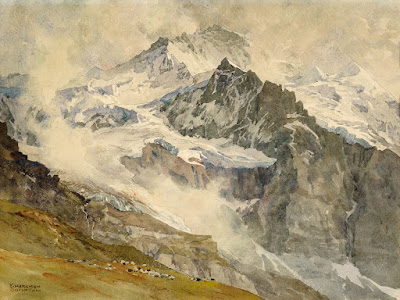 |
| E.T. Compton, Piz Morteratsch, view from Fuorcla Boval on the northern flank |

Note the
 |
| E.T. Compton, The Weisshorn seen from the Furgg Glacier above Zermatt |
He was inspired to become mountain painter when, at age 19, he traveled with his family to the Bernese Oberland, where he was impressed with views of the the Eiger, Mönch, and Jungfrau peaks.
He was a skilled mountaineer who made over 300 major ascents, with 27 first climbs.
 |
| E.T. Compton, Study of the Gorner Glacier, Zermatt, watercolor |
He often brought his watercolors with him to document what he saw.
Note how muted the colors are in this painting—just subtle warm and cool grays—and how he adds mystery by veiling part of the view in a fragment of clouds.
His son Edward Harrison Compton, shown here, was also a mountain painter.
-----
Read More
Wikipedia: Edward Theodore Compton









7 comments:
Wow. Thanks for introducing this artist. All that climbing, all those first ascents — he was clearly driven by a love and passion for the high peaks. His clothing and equipment would be heavier than today’s standard, probably less able to provide warmth; yet he completed these remarkable paintings. It’s inspirational.
Amazing. Such power. Such technique.
When confronted with the complexity of the view before him, he simplified those compositions into basically three distinct planes and used atmospheric perspective to create great depth. These are the works of a very knowledgeable artist.
Magnificient paintings!
It is great you are keeping your blog alive James. I don't use facebook so this is one of the few ways to follow you. Thank you!
I wonder how he kept his water colors from freezing up there? Perhaps he had a special trick.
Dear M. Gurney. I am a big fan of Compton and Alpine painting in general. Recently having returned from my own painting expedition into the mont blanc massif, I am filled with awe at Compton's ability to climb and paint. Upon searching for more of his images, your blog came up. Scrolling through your Compton images, I was intrigued by your observation of water in the foreground of one of his paintings. At first I was drawn to see something I had not noticed before. But on closer inspection, I have to point out to you, that it is indeed solid ice, and not water. The flowing lines of the cracks and dirt in the ice are creating an illusion of movement. At this altitude, a water flow of this size would be impossible due to regular freezing temperatures. Thank you however for bringing Compton to the forefront of people's awareness, a highly under-rated painter.
Toby M WRIGHT
Toby, thanks, and that makes sense. If that was water at that altitude, something would have to be way wrong.
Post a Comment